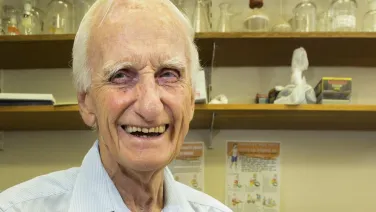News & events
News & events
Find out about our latest news and events.

On Monday, 28 November, Emeritus Professor Howard Bradbury passed away.

Howard worked tirelessly to translate science into effective actions to improve the lives of some of the poorest people in the world. His passion, humour and determination inspired many of us and one of his greatest wishes was to see that work to prevent konzo continue. We will do our best to honour his legacy.

Howard Bradbury followed in his father’s footsteps. “Dad was a chemist and he used to keep telling me stories about it all the time. I couldn’t understand what he said, but somehow something just rubbed off and so I always thought science would be real fun, so I just went into it. I must say I’ve enjoyed every minute."

Tackling one of tropical Africa's crippling epidemic diseases has been an interesting and demanding retirement project, as HOWARD BRADBURY AM writes. Through our work, konzo has now been prevented in 16 villages, which has involved more than 10,000 people.
Choosing a mate is one of the most important decisions an animal can make. The fitness costs and benefits of mate choice have been analysed extensively in the context of sexual selection, and the neural and hormonal bases of mate choice have provided insights into how animals make such decisions.
Athena Aktipis discusses how an evolutionary approach to understanding and treating cancer can transform it from being a disease that threatens our lives to one we can live with.

Studying physiological responses in animals can tell us a lot about how much environmental stress animals can tolerate, helping to improve our understanding of animal biology and inform conservation management actions.
Bob Wong considers the role that behaviour plays in determining the fate of species under human-induced environmental change.

In anisogamous mating systems, males and females play different roles. This results in sexual differences in morphology and behaviour.

In this talk, I will introduce a suite of new methods and biological insights gained from the assembly and analysis of Eucalyptus genomes. I will start by introducing new methods of assembling and assessing nuclear, mitochondrial, and chloroplast genomes with long- and short-read data.